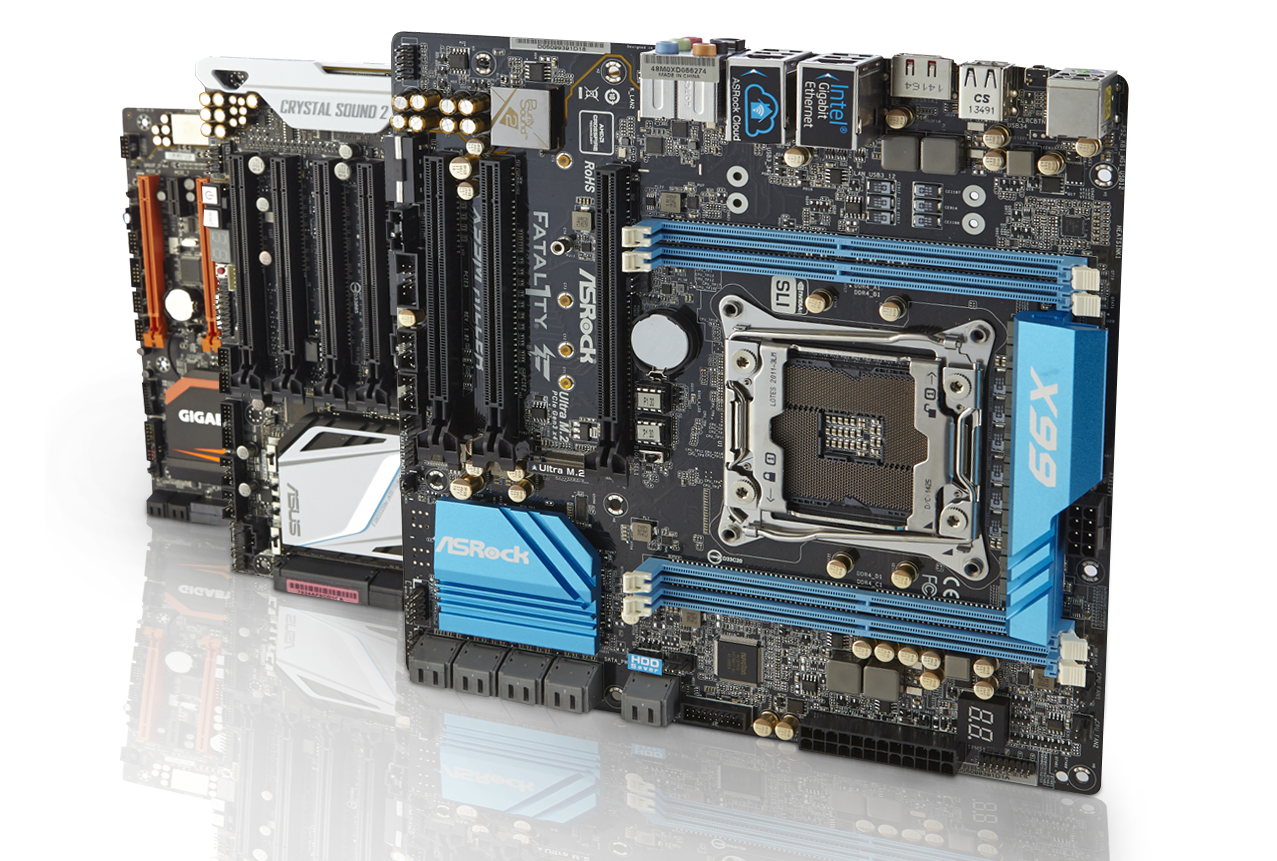X99 motherboard roundup: 7 motherboards reviewed

You can build yourself a gaming rig out of a bargain-priced, dual core processor and a budget motherboard. I’ve had Far Cry 4 running at max settings on a 1080p machine that cost less than either of the latest consoles. Or, you can spend thousands creating a PC that nails the absolute highest framerates.
If you want the top of the current tech tree it’s got to be the latest Intel Haswell-E platform: X99.
Want to jump straight to the tests? Click here to head to page two.
DDR4: The most advanced memory technology available, used in X99 boards as a result of their server heritage. DDR4's lower power demands, high bandwidth and higher density make it perfect for hte professional world.
M.2: The most-used interface for the new PCIe-based SSDs. X99 has doubled the available bandwidth for compatible drives.
PCIe x16: "16" refers to the number of PCIe lanes, and thus the bandwidth, available to a device plugged into a PCI Express x16 slot on a motherboard. In multi-GPU setups the available lanes will be split between the cards.
But why would I want to spend so much on building my PC?
The easy answer is future-proofing. Spend big now and you’ll be set for years. But that should still be tempered with a little restraint –there’s little point in spending over the-odds on every part of your system. You don’t need 32GB of DDR4 memory, for example, and probably won’t for another decade.
Do I need a $1050 (£800) processor?
Heavens, no. I’d argue almost no one does. The top Core i7-5960X is a modern marvel of Intel’s technical expertise, packing in eight of the latest 22nm Haswell cores, all running at breakneck speeds and eminently overclockable to boot. But unless you’re into serious, computationally heavy number crunching work you’re never going to see a return on your investment.
Keep up to date with the most important stories and the best deals, as picked by the PC Gamer team.
Where the Haswell-E platform gets interesting is at the bottom of the range. There are only three processors in this line-up, with the ultra-expensive 5960X at the top and another pricey beast in the middle. But at the bottom is one of my favourite chips of the last year and the missing link between Haswell and Haswell-E: the Core i7 5820K.
It’s priced only a little higher than the top i7 of the Z97 platform, but packs in another two cores to become the cheapest six-core CPU Intel has ever produced. It’s better than the £800 Extreme edition chip from the last generation.
Do I have to spend a fortune on an X99 motherboard?
Again, you can if you want to. But the most pleasing thing about this platform is that you don’t have to. You can spend less on your X99 board than you might on a high-end Z97 equivalent and it will still deliver the very best PC technology currently available.
What does an X99 board offer beyond Haswell-E support?
The big thing for gamers is that this platform has the highest bandwidth for a multi-GPU setup. The standard i7/Z97 combo offers only16 native PCIe 3.0 lanes for the whole machine, while an 5820K paired with an X99 board can offer 28. While that still won’t provide x16/x16 bandwidth on two graphics cards, it gives you more than a dual-GPU Z97 would.The X99 also has a full x4 bandwidth M.2 socket. That’s twice the bandwidth the standard Z97 M.2 interface offers, and won’t hobble future PCIe-based SSDs the way the lower platform will.

How we tested
CPU performance: An i7-5960X CPU was used with Cinebench and X264 v4 to find the relative performance differences between boards.
Gaming performance: Battlefield 4 was used at max settings at 1080p, with a GTX780Ti graphics card, to look for performance differences between the motherboards.
Overclocking performance: As long as single-threaded performance remains crucial for gaming, a decent overclock will boost framerates. Ease and stability of overclocking was thus factored into the overall score for each board.
Page 1: Introduction to X99 motherboards
Page 2: MSI X99 SLI Plus, Asrock X99M Extreme4, Asus X99-Deluxe, Gigabyte X99-SOCForce
Page 3: Asus X99-A, Asrock Fatality X99 Killer, EVGA X99 Micro, benchmark scores

Dave has been gaming since the days of Zaxxon and Lady Bug on the Colecovision, and code books for the Commodore Vic 20 (Death Race 2000!). He built his first gaming PC at the tender age of 16, and finally finished bug-fixing the Cyrix-based system around a year later. When he dropped it out of the window. He first started writing for Official PlayStation Magazine and Xbox World many decades ago, then moved onto PC Format full-time, then PC Gamer, TechRadar, and T3 among others. Now he's back, writing about the nightmarish graphics card market, CPUs with more cores than sense, gaming laptops hotter than the sun, and SSDs more capacious than a Cybertruck.

